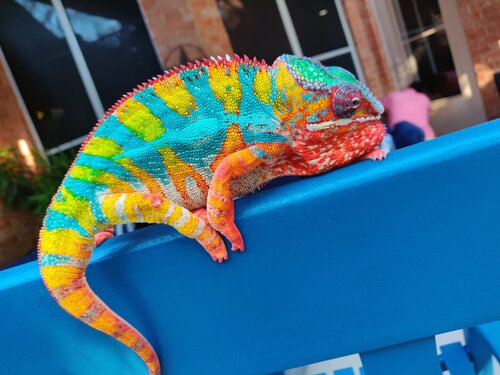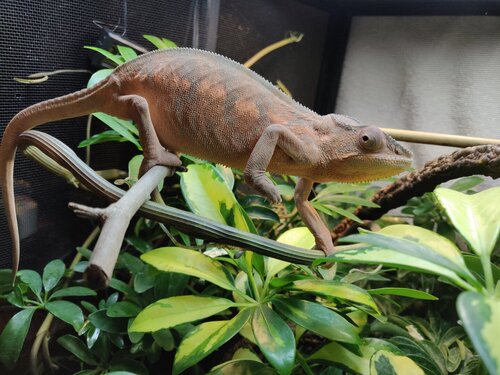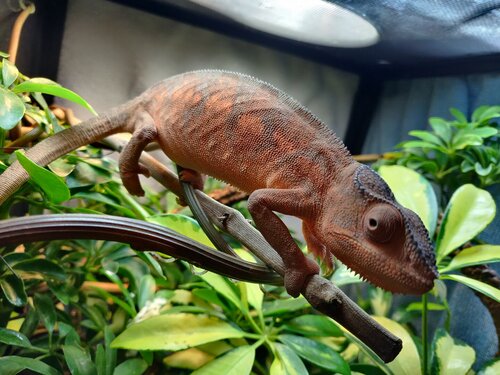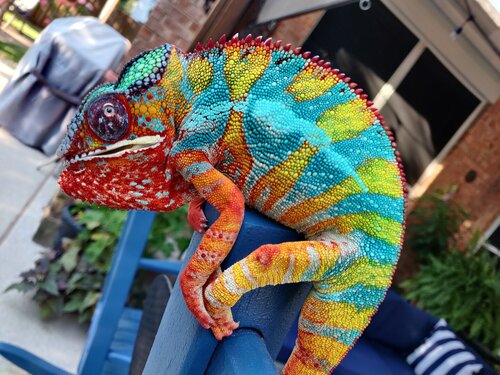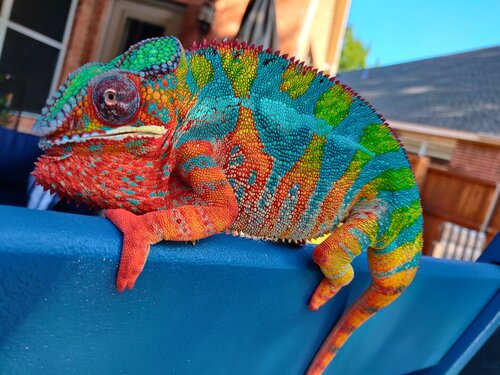Han0915
Member
Hello all,
I have a rather sad question that I'm looking for any type of advice for. I just got into breeding panther chameleons and my first clutch of 24 healthy eggs began hatching October 22nd (5.7 months old). The first 15 eggs hatched perfectly, all the babies looked wonderful, except one however. This baby is very frail, weak, and wobbly and needed assistance out of the egg (his umbilical cord had wrapped around his legs, trapping him). He needed help eating during the first 1-2 weeks, but could eat on his own at least. Now, he has stopped and I am essentially force feeding him.
So I thought that was the only hiccup I'd had. But it took 2-3 more weeks for the remaining 9 eggs to hatch. I thought this was strange, but I left them alone. To summarize how horrible these 9 eggs went... only 2 made it and are doing alright. One of the first babies hatched perfectly but was born with a prolapse (tried treating, but he passed 3 days later). Then next, 3 eggs had shrunk but never hatched. I ended up noticing the shell had hardened and the babies basically couldn't pip, possibly my humidity levels were to blame for those 3. I ended up cutting the eggs as a last hope, and saw 2 perfectly formed babies yet again, one had a prolapse, and the 3rd baby seemed underdeveloped with a swollen head. So I bumped up the humidity levels and gently dropped water onto the remaining 4 eggs, and only one pipped but never came out. I assisted that baby and he is currently on the brink of death (was born very small and weak). The other eggs had the same issue- shrunk but never hatched, and when I decided to cut the eggs, I found a fully formed baby and another one with a swollen head.
I'm at only 18 babies from this first clutch, however risk losing two of them, AKA the ones I've been trying to save. They would have otherwise died. I knew what I was getting myself into when it came to breeding, but to lose THAT many eggs and babies seems wrong. And I want to know what could have possibly gone wrong, did I do something incorrect? I mean, they were incubated at average of 74-76F in my closet (I have since done my best to lower the temps for the remaining clutches to 72-73F). I monitored the humidity and weight of the container weekly (container was just a tubaware with only a couple holes at the top, and vermiculite as media). What makes me question things is how the first 15 eggs hatched perfectly healthy babies, besides 1 runt, but the remaining 9 eggs had numerous problems. This was my females and males first clutch ever, so I wasn't sure if maybe the first clutches tend to have issues perhaps? I made sure she had calcium + bee pollen daily with her meals along w/ the other supplements, but perhaps it wasn't enough? Maybe that's why I ended up with so many bad eggs? I currently have around 100 eggs more incubating from these two, so I truly hope this experience was a fluke of nature. But is there any advice one can give me on how to prevent these types of things? Or could I have done something better/different?
As a rookie breeder, I do take this seriously and I WANT to learn and better this hobby. These animals are my babies, and I just want to make sure I do right by them so any information is helpful.
I have a rather sad question that I'm looking for any type of advice for. I just got into breeding panther chameleons and my first clutch of 24 healthy eggs began hatching October 22nd (5.7 months old). The first 15 eggs hatched perfectly, all the babies looked wonderful, except one however. This baby is very frail, weak, and wobbly and needed assistance out of the egg (his umbilical cord had wrapped around his legs, trapping him). He needed help eating during the first 1-2 weeks, but could eat on his own at least. Now, he has stopped and I am essentially force feeding him.
So I thought that was the only hiccup I'd had. But it took 2-3 more weeks for the remaining 9 eggs to hatch. I thought this was strange, but I left them alone. To summarize how horrible these 9 eggs went... only 2 made it and are doing alright. One of the first babies hatched perfectly but was born with a prolapse (tried treating, but he passed 3 days later). Then next, 3 eggs had shrunk but never hatched. I ended up noticing the shell had hardened and the babies basically couldn't pip, possibly my humidity levels were to blame for those 3. I ended up cutting the eggs as a last hope, and saw 2 perfectly formed babies yet again, one had a prolapse, and the 3rd baby seemed underdeveloped with a swollen head. So I bumped up the humidity levels and gently dropped water onto the remaining 4 eggs, and only one pipped but never came out. I assisted that baby and he is currently on the brink of death (was born very small and weak). The other eggs had the same issue- shrunk but never hatched, and when I decided to cut the eggs, I found a fully formed baby and another one with a swollen head.
I'm at only 18 babies from this first clutch, however risk losing two of them, AKA the ones I've been trying to save. They would have otherwise died. I knew what I was getting myself into when it came to breeding, but to lose THAT many eggs and babies seems wrong. And I want to know what could have possibly gone wrong, did I do something incorrect? I mean, they were incubated at average of 74-76F in my closet (I have since done my best to lower the temps for the remaining clutches to 72-73F). I monitored the humidity and weight of the container weekly (container was just a tubaware with only a couple holes at the top, and vermiculite as media). What makes me question things is how the first 15 eggs hatched perfectly healthy babies, besides 1 runt, but the remaining 9 eggs had numerous problems. This was my females and males first clutch ever, so I wasn't sure if maybe the first clutches tend to have issues perhaps? I made sure she had calcium + bee pollen daily with her meals along w/ the other supplements, but perhaps it wasn't enough? Maybe that's why I ended up with so many bad eggs? I currently have around 100 eggs more incubating from these two, so I truly hope this experience was a fluke of nature. But is there any advice one can give me on how to prevent these types of things? Or could I have done something better/different?
As a rookie breeder, I do take this seriously and I WANT to learn and better this hobby. These animals are my babies, and I just want to make sure I do right by them so any information is helpful.






